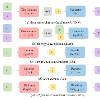Generative models such as Generative Adversarial Networks (GANs) and Variational Auto-Encoders (VAEs) are widely utilized to model the generative process of user interactions. However, these generative models suffer from intrinsic limitations such as the instability of GANs and the restricted representation ability of VAEs. Such limitations hinder the accurate modeling of the complex user interaction generation procedure, such as noisy interactions caused by various interference factors. In light of the impressive advantages of Diffusion Models (DMs) over traditional generative models in image synthesis, we propose a novel Diffusion Recommender Model (named DiffRec) to learn the generative process in a denoising manner. To retain personalized information in user interactions, DiffRec reduces the added noises and avoids corrupting users' interactions into pure noises like in image synthesis. In addition, we extend traditional DMs to tackle the unique challenges in practical recommender systems: high resource costs for large-scale item prediction and temporal shifts of user preference. To this end, we propose two extensions of DiffRec: L-DiffRec clusters items for dimension compression and conducts the diffusion processes in the latent space; and T-DiffRec reweights user interactions based on the interaction timestamps to encode temporal information. We conduct extensive experiments on three datasets under multiple settings (e.g. clean training, noisy training, and temporal training). The empirical results and in-depth analysis validate the superiority of DiffRec with two extensions over competitive baselines.
翻译:生成模型如生成对抗网络(GANs)和变分自编码器(VAEs)被广泛应用于模拟用户行为。然而,这些生成模型存在内在局限性,比如GANs的不稳定性和VAEs的受限表示能力,这些局限性阻碍了对复杂用户交互生成过程的准确建模,例如由各种干扰因素引起的嘈杂交互。考虑到扩散模型在图像合成方面比传统生成模型更具有优势,我们提出一种新的基于扩散模型的推荐算法(DiffRec),以迭代方式学习去噪的生成过程,以保留用户交互的个性化信息。为了解决推荐系统中的独特挑战,例如大规模项目预测的高资源成本和用户偏好的时态变化,我们扩展了传统扩散模型。其中,L-DiffRec通过聚类压缩维度,在潜空间中进行扩散过程;T-DiffRec 根据交互时间戳重新权重用户交互以编码时间信息。在多种设置(如清洁训练、嘈杂训练和时间训练)下,我们在三个数据集上进行了大量实验。实证结果和深入分析验证了DiffRec和两个扩展算法相对于竞争基线的优越性。


